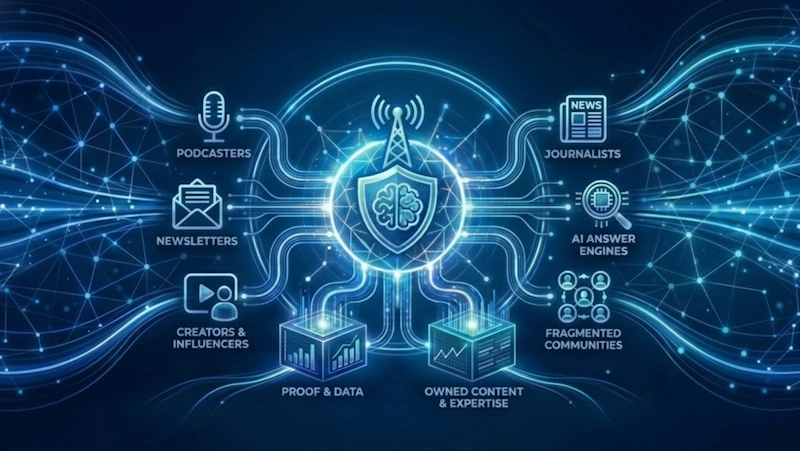7 Risks AI Poses to Corporate Reputation

Artificial Intelligence is reshaping industries and transforming business and society. However, the integration of AI into business ecosystems poses significant risks. As with any challenge, there is an opportunity to get in front of these issues and communicate proactively to build trust with your key stakeholders. Here are seven AI-related risks that can negatively impact corporate reputation.
1. Cybersecurity Risks
Cybersecurity attacks where sensitive customer data or proprietary information is compromised through AI-powered phishing and impersonation of human security measures such as voice and passwords. It wasn't long ago that banks and financial institutions were using customers' voice as a strong multi-factor authentication method. No more. AI can now replicate human voices in almost perfect parity.
2. Opacity of AI Models
The risk to corporate reputation from AI systems stems primarily from the opacity of AI models, often referred to as "black boxes." This lack of transparency can lead to distrust among customers and stakeholders if the decision-making process of the AI is unclear or if the AI outputs are perceived as biased or unfair.
Corporate reputation faces significant risks from AI systems given the model's decision-making processes are opaque and the sources of training data are typically undisclosed. To safeguard reputations, organizations should commit to AI transparency by implementing measures such as developing clear AI governance frameworks, conducting regular AI audits, and ensuring that AI operations are explainable to stakeholders.
These measures aim to enhance understanding and trust in AI systems, thus protecting the organization's reputation by ensuring that these technologies are used responsibly and transparently.
3. Ethical Integrity
The ethical integrity of AI systems is crucial. Embedded biases related to race, gender, or ethnicity in AI technologies can lead to discriminatory outcomes, harming individuals and damaging corporate reputation. To address these concerns, organizations must ensure diverse datasets, inclusive design practices and input from traditionally marginalized groups as the foundations to AI development. Regular bias testing and updates are essential to maintain fairness and uphold ethical commitments.
By proactively managing these risks with a structured approach to fairness in AI, organizations can prevent discrimination and foster trust among users and stakeholders.
4. Disinformation
The risk of disinformation propagated by AI systems is a growing concern as these technologies can now generate highly realistic yet misleading or entirely false information in the form of text, voice, video and even deep fakes of specific individuals. This capability poses significant threats to societal trust and can implicate organizations in misinformation campaigns, damaging corporate or leadership's credibility and trustworthiness.
To combat disinformation, organizations must implement strict ethical guidelines for AI use, enhance transparency around AI-generated content, and invest in technology that detects false information. Ensuring accountability in organizational AI deployments is crucial to maintaining trust.
5. Workplace Impact
Workplace issues and employee concerns about AI include fears of job displacement, lack of understanding of AI technologies, and concerns about workplace surveillance and privacy. These issues can lead to employee dissatisfaction, resistance to technological adoption, and potential legal challenges.
As AI is integrated into our workplaces, it's crucial to address employee concerns transparently and empathetically. This includes open communication about AI's role and impact, training programs to ensure workforce adaptability, and robust privacy safeguards to protect employee data. By doing so organizations can foster a supportive environment that enhances productivity and maintains organizational integrity.
6. AI-Induced Crises
AI-induced crises can arise from unexpected failures or malfunctions in AI systems, leading to operational disruptions, safety incidents, or severe financial losses. These crises can undermine stakeholder trust and have long-lasting impacts on an organization's reputation and financial stability.
To mitigate these risks, organizations should implement thorough testing and validation protocols for AI systems, establish rigorous monitoring mechanisms to detect and respond to anomalies quickly, and develop clear crisis management frameworks that outline procedures for dealing with AI-induced emergencies efficiently and transparently.
It is never too early to build and maintain a robust incident response, reporting and crisis communications processes to swiftly address AI-related emergencies, safeguarding both business continuity and corporate reputation.
7. Malicious Use of AI Systems
The malicious use of AI systems by humans, such as for creating deep fakes, automating cyber attacks, or manipulating data, poses significant security and ethical risks. These actions can harm individuals, undermine public trust, and damage organizational integrity.
Organizations should invest in advanced cybersecurity defenses, conduct regular security audits of their AI systems, and establish strict ethical guidelines and training for AI usage to prevent and mitigate the risks associated with its malicious use.
By promoting a culture of ethical AI use and ensuring strong cybersecurity measures, organizations can protect other employees, stakeholders and uphold commitments to responsible use of AI.
How PR/Comms Can Help
AI technologies pose risks but also create opportunities. Here are four ways strategic communications can help organizations mitigate risk and maximize opportunities related to the adoption and deployment of AI systems:
- Crisis Readiness: Mitigate potential crises by ensuring your readiness to respond to any issue quickly and effectively.
- No-Hype PR: Communicating openly and consistently to key stakeholders about how you are deploying AI technology builds trust and engagement.
- Showcase Innovation: AI innovation presents a broad opportunity to communicate corporate strategy and technology leadership.
- Front-Footed Ethics: Lead the conversation on ethical, bias-free AI by highlighting your commitment to responsible AI practices.
As an agency that focuses on B2B Technology, the team at Actual Agency is ready to help you deliver media coverage, thought leadership and market-leading commentary about the impact of technology on business transformation. If you are looking for a B2B Tech PR agency that delivers results, contact the Actual Agency team today!




